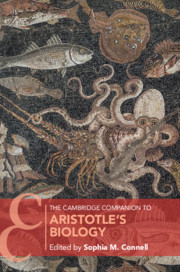Book contents
- The Cambridge Companion to Aristotle’s Biology
- OTHER VOLUMES IN THE SERIES OF CAMBRIDGE COMPANIONS
- The Cambridge Companion to Aristotle’s Biology
- Copyright page
- Contents
- Figures
- Contributors
- Abbreviations
- Introduction
- Chapter 1 Biology and Theology in Aristotle’s Theoretical and Practical Sciences
- Chapter 2 The Presocratics, Plato, and Aristotle’s Biology
- Chapter 3 Aristotle’s Biology and Early Medicine
- Chapter 4 Empiricism and Hearsay in Aristotle’s Zoological Collection of Facts
- Chapter 5 Parts of Animals Book 1 on Methods of Inquiry
- Chapter 6 Teleological Perspectives in Aristotle’s Biology
- Chapter 7 Aristotle’s Biological Metaphysics
- Chapter 8 Life-Cycles and the Actions of Nutritive Soul in Aristotle
- Chapter 9 Aristotle on Animal Generation and Hereditary Resemblance
- Chapter 10 The Science of Perception in Aristotle
- Chapter 11 Aristotle’s Theory of Animal Agency and the Problem of Self-Motion
- Chapter 12 Animal Cognition in Aristotle
- Chapter 13 Elements of Biology in Aristotle’s Political Science
- Chapter 14 The Early Reception of Aristotle’s Biology
- Chapter 15 The Reception of Aristotle’s Biology in Late Antiquity and Beyond
- Chapter 16 Aristotelian Teleology and Philosophy of Biology in the Darwinian Era
- Chapter 17 Aristotle and Contemporary Biology
- Afterword: Philosophical Issues in Aristotle’s Biology – Its Coming-to-Be and Its Being
- Bibliography
- General Index
- Index Locorum
- OTHER VOLUMES IN THE SERIES OF CAMBRIDGE COMPANIONS
- References
Chapter 14 - The Early Reception of Aristotle’s Biology
Published online by Cambridge University Press: 14 May 2021
- The Cambridge Companion to Aristotle’s Biology
- OTHER VOLUMES IN THE SERIES OF CAMBRIDGE COMPANIONS
- The Cambridge Companion to Aristotle’s Biology
- Copyright page
- Contents
- Figures
- Contributors
- Abbreviations
- Introduction
- Chapter 1 Biology and Theology in Aristotle’s Theoretical and Practical Sciences
- Chapter 2 The Presocratics, Plato, and Aristotle’s Biology
- Chapter 3 Aristotle’s Biology and Early Medicine
- Chapter 4 Empiricism and Hearsay in Aristotle’s Zoological Collection of Facts
- Chapter 5 Parts of Animals Book 1 on Methods of Inquiry
- Chapter 6 Teleological Perspectives in Aristotle’s Biology
- Chapter 7 Aristotle’s Biological Metaphysics
- Chapter 8 Life-Cycles and the Actions of Nutritive Soul in Aristotle
- Chapter 9 Aristotle on Animal Generation and Hereditary Resemblance
- Chapter 10 The Science of Perception in Aristotle
- Chapter 11 Aristotle’s Theory of Animal Agency and the Problem of Self-Motion
- Chapter 12 Animal Cognition in Aristotle
- Chapter 13 Elements of Biology in Aristotle’s Political Science
- Chapter 14 The Early Reception of Aristotle’s Biology
- Chapter 15 The Reception of Aristotle’s Biology in Late Antiquity and Beyond
- Chapter 16 Aristotelian Teleology and Philosophy of Biology in the Darwinian Era
- Chapter 17 Aristotle and Contemporary Biology
- Afterword: Philosophical Issues in Aristotle’s Biology – Its Coming-to-Be and Its Being
- Bibliography
- General Index
- Index Locorum
- OTHER VOLUMES IN THE SERIES OF CAMBRIDGE COMPANIONS
- References
Summary
This chapter examines the reception of Aristotle’s biological work from his immediate successors to Roman intellectuals in the late Republic and early Empire. The Peripatetics, notably Theophrastus and Eudemus, endorsed many hallmarks of Aristotelian biology (e.g. classification by differentiae in Theophrastus’ Researches into Plants), and their works on animals focused mainly on areas that were relatively underexplored by Aristotle, such as animal behavior and “character.” Readers and users of Aristotle’s biological works outside philosophical circles were mainly interested in the wealth of facts collected in the Historia Animalium especially, and much less in Aristotle’s causal investigations. The main product of this scholarly engagement with Aristotle’s biology was the Epitome by Aristophanes of Byzantium, librarian at Alexandria around 200 BCE: it does aim to collect facts arranged by individual animals, but it also shows an interest in the main problems raised in GA. In Rome, Lucretius and Cicero were able to draw on Aristotelian biology to bolster arguments for Epicurean materialism and Stoic providentialism respectively. Finally, it is noteworthy that the now-lost Dissections played an important role in the early reception of Aristotle’s biology, at least until Apuleius in the second century CE.
Keywords
- Type
- Chapter
- Information
- The Cambridge Companion to Aristotle's Biology , pp. 228 - 245Publisher: Cambridge University PressPrint publication year: 2021
References
Guide to Further Reading
- 2
- Cited by

